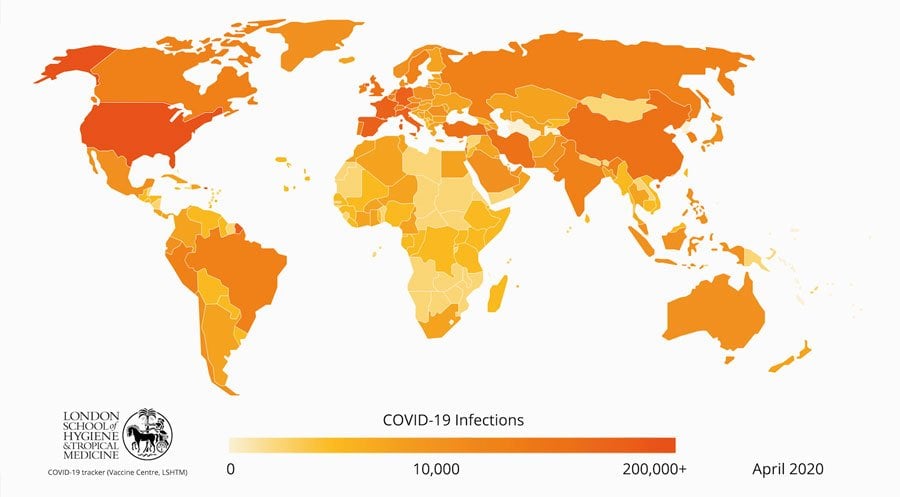LSHTM awarded over £2.5m in new grants to tackle COVID-19 pandemic
15 May 2020 London School of Hygiene & Tropical Medicine London School of Hygiene & Tropical Medicine https://lshtm.ac.uk/themes/custom/lshtm/images/lshtm-logo-black.png
Map of COVID-19 infections April 2020. Credit: LSHTM
LSHTM is at the forefront of the global effort to fight COVID-19. Thanks to over £2.5 million of new research grants, our world-leading scientists are now using their diverse expertise – from mathematical modelling to machine learning and contact tracing to citizen science – to tackle the pandemic.
With governments and organisations around the world facing unprecedented public health challenges, there is an urgent need for robust scientific evidence to provide solutions. With our strong track record of responding to emergencies and major outbreaks, world-class epidemiology capabilities and social sciences expertise, our researchers have been pivotal to the global pandemic response. In recent weeks, many of our innovative research groups have shifted their focus to tackle the complex challenges presented by the new coronavirus.
Scientists at LSHTM have been awarded a grant from the European Commission to play a leading role in the EpiPose study, which aims to answer critical questions about the epidemiological characteristics of the coronavirus outbreak. The UK arm of the programme is led by Professor Mark Jit, and forms part of a consortium of six institutes across five European countries.
Together, the team is pooling their complementary public health expertise to study the social dynamics of the outbreak, related public health preparedness and response to the ongoing epidemic, and to assess its economic impact.
They have already published findings from a real-time study, led by co-investigator Professor John Edmunds, on physical distancing policies implemented by the UK government. They indicated that these measures are significantly reducing the rate at which people meet each other to below the level needed to maintain infection over the long term. Similar studies have also been launched in Belgium, the Netherlands, and Norway, providing key information for policymakers.
With a grant from the World Health Organisation (WHO), Chris Grundy is developing a new global database of public health and social measures that have been implemented to reduce the spread of COVID-19. The database will record which measures – such as handwashing, social distancing, closing certain businesses and schools, disinfecting public places, case detection and contact tracing – are in place across countries, states, and cities at any given time.
Several different groups and organisations around the world, including Oxford University, John Hopkins University, and the US Centre for Disease Control have been collecting data, and the group will use a citizen science approach to collate, clean, and simplify over 50,000 records. This open-source database will be a vital tool for researchers and policymakers worldwide to understand how measures can be most effectively implemented or relaxed to control the disease.
Professor Francesco Checchi has been awarded a grant by the Wellcome Trust to perform an epidemiological and economic evaluation of how COVID-19 can be managed in low- and middle-income (LMIC) and crisis-affected countries, where the disease poses a catastrophic threat.
His team will assess the economic and health implications of different measures to control the spread of the virus, including ‘alternative’ approaches such as shielding high-risk populations. They will provide advice and technical support to LMIC governments, donors, and humanitarian actors on COVID-19 strategy, enabling them to make evidence-based decisions to manage the pandemic.
With another grant awarded by the Wellcome Trust, Professors Matthew Cotten and Martin Antonio are leading a project called AFRICO19. This collaboration between the MRC/UVRI and LSHTM Uganda Research Unit, the MRC Unit The Gambia, KEMRI-Wellcome Trust Research Programme, Kenya, and the University of Glasgow aims to boost capacity in these three African countries to detect and monitor COVID-19 spread.
This is the first time the units in Uganda and The Gambia have secured joint funding for a project since they became part of LSHTM in 2018, and opens up avenues for more future collaborations between the sites.
The project will increase the capacity for rapid diagnosis and sequencing of coronavirus, including the deployment of new diagnostic tools optimised for this virus, to support the health authorities’ contact tracing and quarantining efforts. They will also monitor the spread of the disease in population samples in each of the three countries and use machine learning to provide a real-time analysis of its evolving biology. Their work will be critical to understanding and intervening in the spread of this disease in Africa.
In addition to these grants, we have already announced a number of other coronavirus research programmes, such as our COVID-19 modelling research, led by Professor John Edmunds, our work to promote handwashing globally, led by Dr Robert Aunger. The work of our scientists has never been more critical – whether it’s informing how to relax the lockdown measures here in the UK, or ramping up testing in Africa – as only science and innovation will end this pandemic.
If you enjoyed this article and would like to build a career in global health, we offer a range of MSc programmes covering health and data, infectious and tropical diseases, population health, and public health and policy.
Available on campus or online, including flexible study that works around your work and home life, be part of a global community at the UK's no.1 public health university.